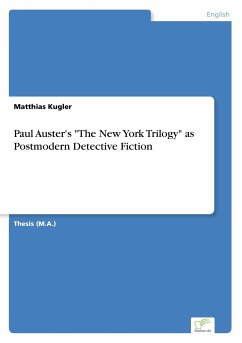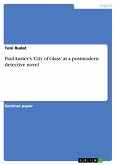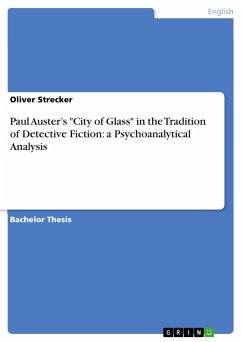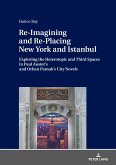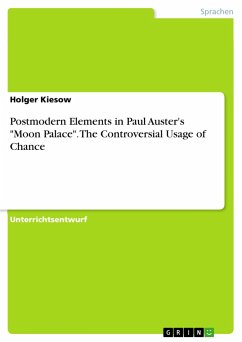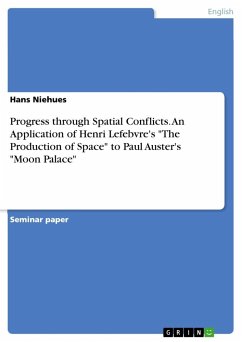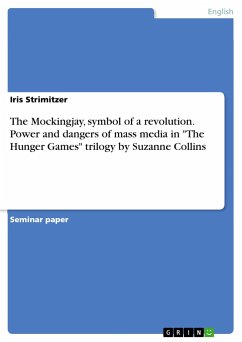Thesis (M.A.) from the year 1999 in the subject American Studies - Literature, grade: 2,1, University of Freiburg (Philosophische Fakultät, Nordamerikastudien), language: English, abstract: Inhaltsangabe:Abstract:
Paul Auster's New York Trilogy, published in one volume for the first time in England in 1988 and in the U.S. in 1990 has been widely categorised as detective fiction among literary scholars and critics. There is, however, a striking diversity and lack of consensus regarding the classification of the trilogy within the existing genre forms of the detective novel. Among others, Auster's stories are described as: metaanti-detective-fiction; mysteries about mysteries; a strangely humorous working of the detective novel; very soft-boiled; a metamystery; glassy little jigsaws; a mixture between the detective story and the nouveau roman; a metaphysical detective story; a deconstruction of the detective novel; antidetective-fiction; a late example of the anti-detective genre; and being related to 'hard-boiled' novels by authors like Hammett and Chandler. Such a striking lack of agreement within the secondary literature has inspired me to write this paper. It does not, however, elaborate further an this diversity of viewpoints although they all seem to have a certain validity and underline the richness and diversity of Auster's detective trilogy; neither do I intend to coin a new term for Auster's detective fiction. I would rather place The New York Trilogy within a more general and open literary form, namely postmodern detective fiction. This classifies Paul Auster as an American writer who is part of the generation that immediately followed the 'classical literary movement' of American postmodernism' of the 60s and 70s. His writing demonstrates that he has been influenced by the revolutionary and innovative postmodern concepts, characterised by the notion of 'anything goes an a planet of multiplicity' as well as by French poststructuralism. He may,however, be distinguished from a 'traditional' postmodern writer through a certain coherence in the narrative discourse, a neo-realistic approach and by showing a certain responsibility for social and moral aspects going beyond mere metafictional and subversive elements. Many of the ideas of postmodernism were formulated in theoretical literary texts of the 60s and 70s and based an formal experiments include the attempt of subverting the ability of language to refer truthfully to the world, and a radical turning away from coherent narrative discourse and plot. These ideas seem to have been intemalized by the new generation of postmodern writers of the 80s to such a degree that the ideas themselves turn into objects of investigation and experiment. Paul Auster seems to be an the right way of leaving the stony ground of The Literature of Exhaustion , which according to John Barth only leads to replenishment if we creatively make use of 'what has been there before'. It might be conceivable to rediscover validly the artifices of language and literature--such farout notions as grammar, punctuation...even characterization! Even plot!--if one goes about it the right way, aware of what one's predecessors have been up to.
This paper asserts that Paul Auster's NYT can be adequately described as a particular form of postmodern detective fiction that may be defined, or rather 'redefined', as a form which an the one hand still makes use of several well-known variations of the detective novel that have developed during the Jong tradition of the genre, such as the classical and the hard-boiled detective novel; but which, an the other hand are only applied by Auster to deviate from this course, subvert the existing elements and deliberately negate the fundamental purposes of the genre by introducing a great variety of postmodern aspects. In this, Auster follows the tradition of the anti-detective novels by such authors ...
Hinweis: Dieser Artikel kann nur an eine deutsche Lieferadresse ausgeliefert werden.
Paul Auster's New York Trilogy, published in one volume for the first time in England in 1988 and in the U.S. in 1990 has been widely categorised as detective fiction among literary scholars and critics. There is, however, a striking diversity and lack of consensus regarding the classification of the trilogy within the existing genre forms of the detective novel. Among others, Auster's stories are described as: metaanti-detective-fiction; mysteries about mysteries; a strangely humorous working of the detective novel; very soft-boiled; a metamystery; glassy little jigsaws; a mixture between the detective story and the nouveau roman; a metaphysical detective story; a deconstruction of the detective novel; antidetective-fiction; a late example of the anti-detective genre; and being related to 'hard-boiled' novels by authors like Hammett and Chandler. Such a striking lack of agreement within the secondary literature has inspired me to write this paper. It does not, however, elaborate further an this diversity of viewpoints although they all seem to have a certain validity and underline the richness and diversity of Auster's detective trilogy; neither do I intend to coin a new term for Auster's detective fiction. I would rather place The New York Trilogy within a more general and open literary form, namely postmodern detective fiction. This classifies Paul Auster as an American writer who is part of the generation that immediately followed the 'classical literary movement' of American postmodernism' of the 60s and 70s. His writing demonstrates that he has been influenced by the revolutionary and innovative postmodern concepts, characterised by the notion of 'anything goes an a planet of multiplicity' as well as by French poststructuralism. He may,however, be distinguished from a 'traditional' postmodern writer through a certain coherence in the narrative discourse, a neo-realistic approach and by showing a certain responsibility for social and moral aspects going beyond mere metafictional and subversive elements. Many of the ideas of postmodernism were formulated in theoretical literary texts of the 60s and 70s and based an formal experiments include the attempt of subverting the ability of language to refer truthfully to the world, and a radical turning away from coherent narrative discourse and plot. These ideas seem to have been intemalized by the new generation of postmodern writers of the 80s to such a degree that the ideas themselves turn into objects of investigation and experiment. Paul Auster seems to be an the right way of leaving the stony ground of The Literature of Exhaustion , which according to John Barth only leads to replenishment if we creatively make use of 'what has been there before'. It might be conceivable to rediscover validly the artifices of language and literature--such farout notions as grammar, punctuation...even characterization! Even plot!--if one goes about it the right way, aware of what one's predecessors have been up to.
This paper asserts that Paul Auster's NYT can be adequately described as a particular form of postmodern detective fiction that may be defined, or rather 'redefined', as a form which an the one hand still makes use of several well-known variations of the detective novel that have developed during the Jong tradition of the genre, such as the classical and the hard-boiled detective novel; but which, an the other hand are only applied by Auster to deviate from this course, subvert the existing elements and deliberately negate the fundamental purposes of the genre by introducing a great variety of postmodern aspects. In this, Auster follows the tradition of the anti-detective novels by such authors ...
Hinweis: Dieser Artikel kann nur an eine deutsche Lieferadresse ausgeliefert werden.

